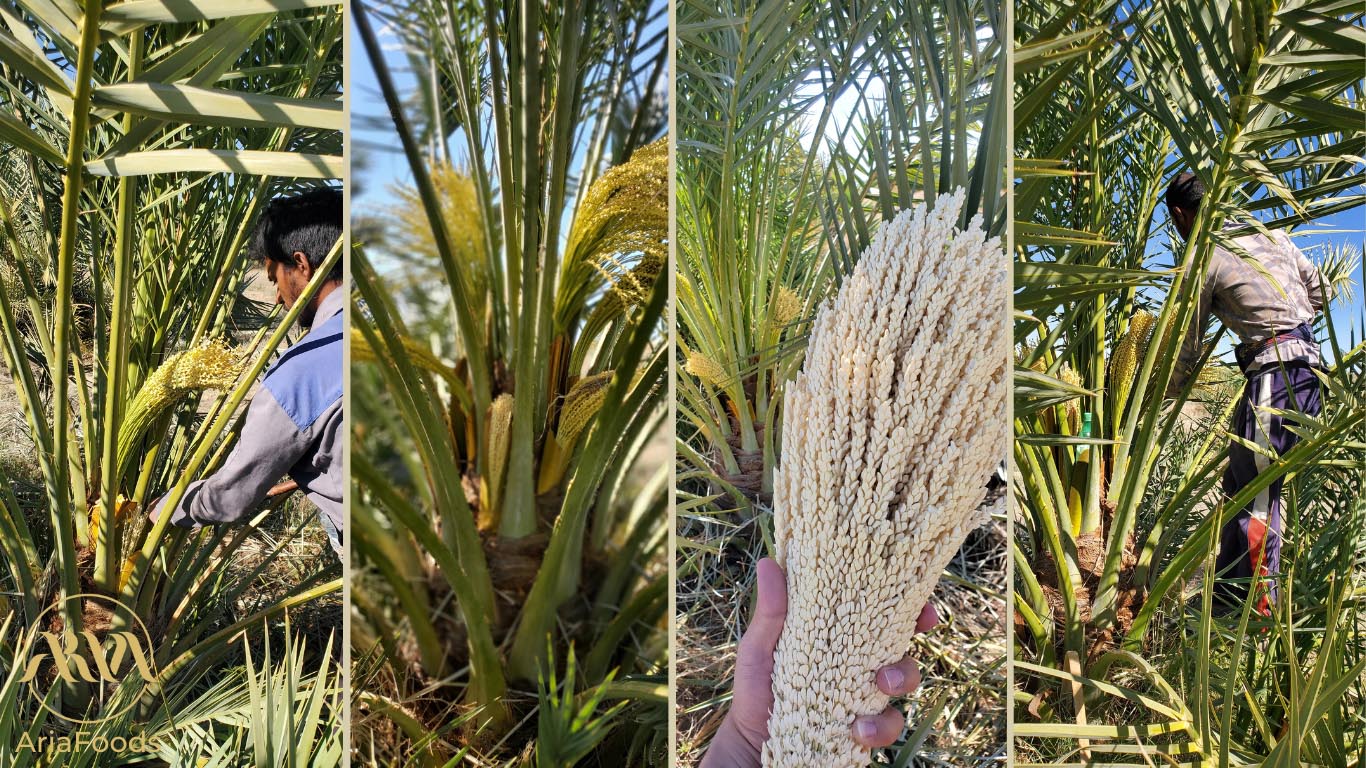What is pollination?
Pollination is one of the crucial stages in the production process of agricultural products, including date palm cultivation, and it is essential to improve the performance and operations of cultivation.
Date palm is one of the important agricultural products in tropical regions, which is widely used in many countries due to its high nutritional value and resistance to harsh weather conditions. However, to have a high yield in date production, attention must be paid to the issue of pollination.
In this article, we examine the date pollination process, factors affecting this process, and date pollination methods. By reading this article, you can learn about date palm pollination and its importance in date production.
What Is the Process of Pollination?
In plants such as dates, which are dioecious, male and female flowers are formed on separate bases, and to pollinate dates, pollen grains must be transferred from the male flower to the female flower.
Date palm pollination occurs during the flowering stage
The process of pollination in date trees, especially in Iran, can be briefly described as follows: Male date flowers produce pollen grains that are inside the carpel. On the other hand, female flowers have a sticky stigma that is surrounded by a protective sheath called a print and are highly fragrant, and this smell can be detected by insects such as bees and butterflies.
During pollination, pollen grains are transferred from the stamens of male flowers to the stigma of female flowers, usually with the help of wind or insects. This allows the male gametes to fertilize the female gametes, resulting in the formation of a fruit. Stamens and carpels are collectively known as the male and female parts of the flower, respectively.
Dates Pollination by Humans:
Dates are pollinated by humans in two different ways:
1. Traditional or Manual Methods:
The act of pollination in date palms is manual, especially in Iran. In this method, the male flower is separated and some of its flowers are placed upside down inside the inflorescence of the female flower.
To increase the probability of insemination, first, they shake the spikes on the female inflorescence so that the pollen falls on it, and after placing it on the female inflorescence, they close it tightly.
Another method of date palm pollination is that before the female palms are ready, the male flowers are separated from the palm and kept in suitable conditions, and after a few days, the pure pollen is mixed with flour or some other ingredients in specific proportions. they do. Then they put it in a thin cloth bag and shake the bag’s contents on the female flowers with a stick or other tools and repeat this several times to increase the probability of inoculation.
2. Modern Methods:
Modern pollination is another method that is carried out using various tools, including pollinators and drones, motorized and electric devices, and recently the use liquid suspension systems. For this, we need dry pollen and we must make sure of the quality of the pollen.
Some of these methods have been proven to be very effective. However, some devices are not used due to their high cost, the need for operator skill, and equipment maintenance.
Commercial dates production requires artificial pollination, which ensures good fertilization and also reduces the number of male palms required.

Effective Factors:
Various factors have an effect on date tree pollination, which can be effective in its positive process
- Environmental factors
The more the number of palm trees, the more chance of pollination
- Environmental conditions
wind, light, humidity, and temperature can all play a role in regulating the activities of plants that are related to date pollination for instance:
- The light
Light also helps the growth of date flowers and thus pollination of dates. Date palm trees require a lot of light and in low light conditions, fewer date flowers may be produced, resulting in a decrease in pollination.
- Human Factors
Human factors can be effective in date palm pollination, for example, in the number and manner of planting palm trees
- physical factors
Physical factors such as wind, humidity, and temperature can also be effective. For example, the wind can carry the pollen to other trees or distant areas, thus intensifying the pollination process. Also, the right temperature and humidity will increase the chance of pollination success.
- Time factors
some date palm species only pollinate at certain times of the year, and otherwise, pollination will be less likely.
The most suitable time for pollination is 1 to 4 days after the opening of the female inflorescence.
The best time for pollination is from 10 am to 3 pm on a sunny day or a temperature of 21-32 degrees Celsius.
- Genetic factors
Some palm species have special genes that are used for better and more effective pollination. Also, some species of dates are more resistant to diseases and adverse environmental conditions, and as a result, they will have more chances of pollination.
- Chemical factors
the use of chemical fertilizers and different growth factors can affect the pollination process. Some diseases and pests can also affect the growth and pollination of date trees.
In this article, we investigated the date palm pollination process and its importance in date production Most farmers are looking for ways to improve pollination to increase the quality of date production.
In other words, pollination can play an effective role in improving date production and increasing farmers’ profitability.
This article was compiled by the AriaFoods team.



